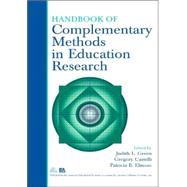
Note: Supplemental materials are not guaranteed with Rental or Used book purchases.
Purchase Benefits
What is included with this book?
| Introduction to the Volume | |
| Preface | p. xi |
| Acknowledgments | p. xiii |
| Introduction to the Handbook: What's Complementary About Complementary Methods? | p. xv |
| On Reading and Using the Volume: Notes to Students | p. xxi |
| Acknowledgment of Advisors and Reviewers | p. xxv |
| Foundations | p. 1 |
| Philosophies of Educational Research | p. 3 |
| Epistemology and Educational Research | p. 33 |
| The Ethics of Educational Research | p. 57 |
| Introduction to Design and Analysis | p. 75 |
| Analyzing the Multidimensionality of Texts in Education | p. 77 |
| Arts-Based Educational Research | p. 95 |
| Case Study Methods | p. 111 |
| Cross-Case Analysis | p. 123 |
| Curriculum Assessment | p. 141 |
| Data Modeling: Structural Equation Modeling | p. 161 |
| Definition and Analysis of Data from Videotape: Some Research Procedures and Their Rationales | p. 177 |
| Design Experiments | p. 193 |
| Developmental Research: Theory, Method, Design and Statistical Analysis | p. 207 |
| Discourse-in-Use | p. 227 |
| Empirical Bayes | p. 243 |
| Estimation | p. 259 |
| Ethnography | p. 279 |
| Finding Patterns with Field Notes | p. 297 |
| Generalizability Theory | p. 309 |
| Historical Research in Education | p. 323 |
| Historical Studies: Groups/Institutions | p. 333 |
| Interviewing in Educational Research | p. 357 |
| Introduction to Measurement Theory | p. 371 |
| Item Response Theory | p. 385 |
| Linear Regression and Hierarchical Linear Models | p. 411 |
| Meta-Analysis: The Quantitative Synthesis of Research Findings | p. 427 |
| The Microgenetic Method: Current Work and Extensions to Classroom Research | p. 439 |
| Multiple Methodology in Education Research | p. 457 |
| Narrative Inquiry | p. 477 |
| Philosophical Inquiry | p. 489 |
| Practitioner Inquiry: Blurring the Boundaries of Research and Practice | p. 503 |
| Probability and Hypothesis Testing | p. 519 |
| Quasi-Experimental Design | p. 539 |
| Randomized Experiments in Educational Research | p. 551 |
| Representing Qualitative Data | p. 567 |
| Research Synthesis: Effect Sizes | p. 583 |
| Statistical Graphics: A Guidepost for Scientific Discovery | p. 605 |
| Survey Methods in Educational Research | p. 623 |
| Survey Sampling | p. 641 |
| Programs of Research | p. 655 |
| Language and Literacy Research: Multiple Methods and Perspectives | p. 657 |
| Official and Unofficial Stories: Getting at the Impact of Policy on Educational Practice | p. 681 |
| Policy Analysis: Studying Policy Implementation | p. 701 |
| Program Evaluation: A Democratic Practice | p. 711 |
| Researching the Complexity of Classroom Interaction | p. 727 |
| Researching Race, Culture, and Difference: Epistemological Challenges and Possibilities | p. 773 |
| Theoretical and Practical Advances Through Research on Learning | p. 795 |
| Programs of Research in Teacher Education | p. 823 |
| Author Index | p. 833 |
| Subject Index | p. 853 |
| Table of Contents provided by Ingram. All Rights Reserved. |
The New copy of this book will include any supplemental materials advertised. Please check the title of the book to determine if it should include any access cards, study guides, lab manuals, CDs, etc.
The Used, Rental and eBook copies of this book are not guaranteed to include any supplemental materials. Typically, only the book itself is included. This is true even if the title states it includes any access cards, study guides, lab manuals, CDs, etc.